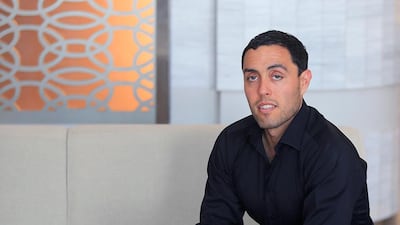For Jairek Robbins, the first of hundreds of personal development seminars he attended while growing up was in his mother’s womb. His mum, Liz Acosta, was showing people how to conquer their fears by breaking bricks with her bare hands. At three months, he was carried over hot coals as part of his dad Tony Robbins’ mission to “awaken the giant within”. Such was life growing up with one of the world’s most popular motivational speakers as a father. But spending a childhood immersed in the American personal development culture didn’t prevent Jairek, now 30, from following in his parents’ path. Five years ago he set up his own coaching venture, Jairek Robbins Companies, and last month he visited Dubai to speak at a meeting of HR professionals.
Your motto is “Learn it, live it, give it” – what does this phrase mean to you?
I grew up around people who were constantly trying to grow. I saw too many people go out and learn information – get a degree, attend seminars, read books – who were so excited about this information that they immediately wanted to share it. But you’d see their friends look at them confused, thinking “you’re saying all these great ideas but you don’t do any of them, so why should I?” So the concept became ‘How do you help someone live what they have learnt, so their life becomes the message?’ Paying it forward is an obvious next step. If it works well for you, then all you want to do is share it.
What lessons did your father teach you?
Dad was clear he was not going to allow me to be a trust fund baby. The moment I graduated, the rule with money was “figure it out on your own”. There were important lessons such as stacking lumber in Canada. I spent three months doing hard physical labour, up at 4.30am six days a week stacking wood, and I was the only one there who spoke English.
Halfway through, I remember thinking “why did I agree to this? I deserve better than this”.
I’d heard other people my age say that about their jobs and I realised there’s a generation of people with that attitude. It dawned on me in that moment that life owes me nothing, and it’s my responsibility to add value to life in every way I can.
How does your company help businesses grow?
It depends on the type of company. With a network marketing company we recently worked with, we developed a strategic training plan for their entire organisation in a six month roll-out – leadership, negotiation and sales training, and personal development work. I worked with a new sales rep who’d never done sales before. He’d just sold his part-ownership in a suit company so he had US$100,000 in the bank, and hoped if he could make $1,500 a month in sales, he wouldn’t have to dip into his savings. It was my job to hold him accountable to take consistent and measurable action every day. We measured his movements, sleep and nutrition using a tracker band. When he’d had a phenomenal day and his sales were better, I would say “what did you do differently?” When you track these things you realise there are patterns that live within people, so when they do certain things consistently, they’re at their best.
How can people maximise their potential at work?
Corporate workers think if they just work a little harder, it's going to finally give them what they really want. My advice would be focus on your passions and strengths. Michael Gerber, in his book The E Myth, talks about how there are different personalities within every organisation: entrepreneurial, manager, leader, and technician. Too many people take a job because of the pay, position or status, but it's not their greatest strength. Therefore they feel an abundance of stress, anxiety and fear. Identify the skill set and activities that make you fall in love with life in that moment and time will disappear and nothing else matters.
What’s the key to having a love of life?
In the beginning, successful people are willing to risk everything to make it happen. But as soon as they’ve achieved something they feel is valuable, they stop taking those risks and doing the things that made them feel most alive. Now they switch modes in their heads to “how do I protect what I have?” Even though they have so much, they feel dead on the inside.
My advice is: don’t risk everything with every roll of the dice, protect yourself – but find a way in some area of your life to still live on that edge.
Robbins' book, Live It! Achieve Success By Living With Purpose is due for release on September 30
business@thenational.ae
Follow us on Twitter @Ind_Insights

